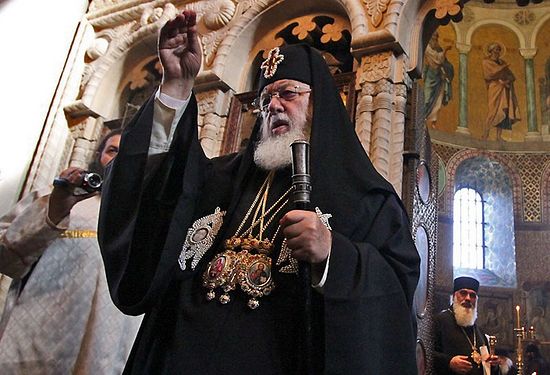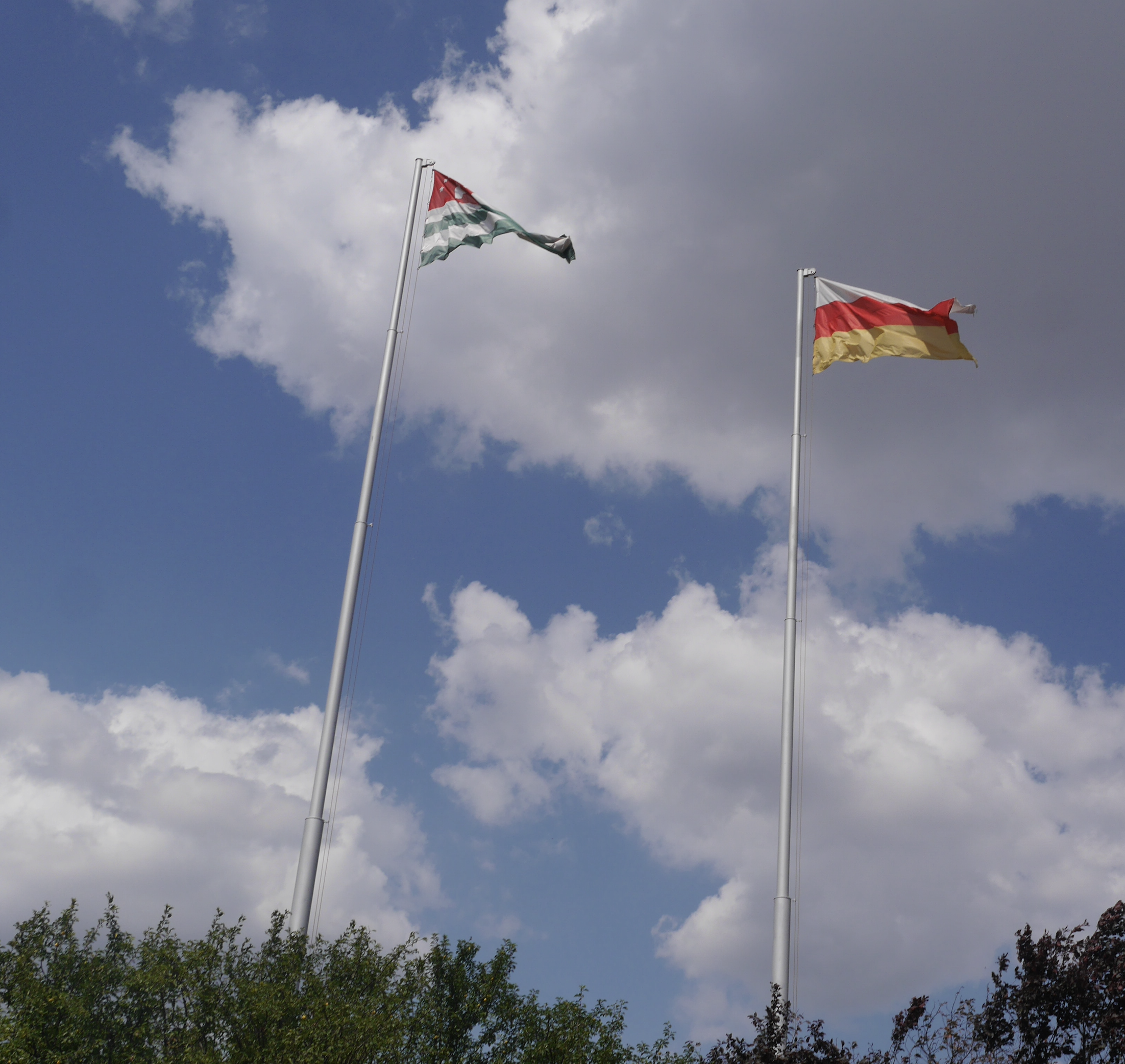
Georgian Orthodox Church Opts for Caution Regarding Ukrainian Autocephaly
Georgian Orthodox Church Opts for Caution Regarding Ukrainian Autocephaly
The main political theme in Georgia in recent days has been the position of the Georgian Orthodox Church (GOC) regarding the recognition of the autocephaly of the Ukrainian Church. On December 27, the Georgian Patriarchate declared that the Holy Synod—the main decision-making body of the GOC—had met to discuss the situation in Ukraine and the broader Orthodox World following the decision of the Patriarch of Constantinople to grant autocephaly to Kyiv. According to the GOC Patiarchate, however, the Georgian Holy Synod decided not to voice an official position on the issue (Civil.ge, January 8, 2019).
The official representative of the Patriarchate in Tbilisi said that discussions regarding Ukrainian autocephaly would continue during subsequent meetings of the Holy Synod. Reportedly, at the December 27 gathering, two letters were read out: the first from the Ecumenical Patriarch of Constantinople, Bartholomew I, asking the other Orthodox Churches to support his decision to grant a tomos (decree) of autocephaly to the Ukrainian Church, and the second from Patriarch Kirill of Moscow, calling on Georgia’s Patriarch Ilia II to condemn the “non-canonical” decision by Constantinople (Civil.ge, January 8, 2019).
“It is sad that the Russian Church stopped communicating with Constantinople. The Ecumenical Patriarchate began the procedure for granting autocephaly to Ukraine. This deepened the crisis. But Church history knows many crises that God managed to overcome,” Patriarch Ilia declared (Civil.ge, January 8, 2019).
Many in Tbilisi and Kyiv had hoped that the Georgian Orthodox Church would be the first to announce support for Ukraine’s autocephaly. Last autumn, while visiting Washington, DC, the head of the independent Ukrainian Orthodox Church–Kyiv Patriarchate said that he expects support from the “Georgian Brothers.” While speaking at an event hosted by the Atlantic Council, Patriarch Filaret noted, “Georgia and Ukraine have both suffered from Russian aggression. So Georgia must support us. We are Orthodox, and we are obliged to pray together” (YouTube, September 19, 2018).
The ruling Georgian Dream party, Prime Minister Mamuka Bakhtadze and President Salome Zurabishvili have all come out in support of the Georgian Church’s “caution” on the Ukrainian issue. At her first press conference since being elected head of state last November, Zurabishvili told journalists that, despite the expectations of many Georgian politicians, she does not intend to congratulate Ukraine on attaining autocephaly. “It would be very easy [personally] to congratulate Ukrainians over the independence of their Church because this would be very natural considering our historical experience. But today, I am not speaking in my personal capacity, I am speaking as the president, and I have a huge responsibility to bear,” she noted. Zurabishvili added, “If the Georgian Orthodox Church is cautious [out of a concern for] certain consequences, which everyone knows, but of which I will not speak of today, I cannot assume the responsibility for aggravating the situation,” (Civil.ge, January 12, 2019).
The Georgian authorities’ meek stance generated outrage among the opposition. “It is strange, that a diplomat from the French school, Salome Zurabishvili, who grew up in France [Zurabishvili previously held French citizenship and has served as France’s ambassador to Tbilisi], declares her unwillingness to recognize the autocephaly of Ukraine,” David Berdzenishvili, one of the leaders of the Republican Party of Georgia, told this author on January 12. He stressed that the issue of the Ukrainian Church’s independence “is not only a religious issue, but also a geopolitical one. […] There is a battle for the future of Ukraine and all of Europe. That is why US Secretary of State [Michael] Pompeo congratulated Ukrainians on achieving autocephaly,” Berdzenishvili underscored. Additionally, he cited the late former US National Security Advisor Zbigniew Brzezinski’s well-known contention that “without Ukraine, Russia can no longer become an empire.”
Berdzenishvili expressed confidence that the GOC will soon be forced to recognize the Kyiv Church’s autocephaly, in order not to be isolated within the Orthodox World. At the same time, Berdzenishvili shared with the author some alleged details of the last meeting of the Holy Synod. According to him, 10 of the 47 members of the Holy Synod “openly called for the immediate recognition of the independence of the Ukrainian Church.” The caution of the rest of the hierarchs of the Georgian Church, Berdzenishvili argued, can be explained by “their close ties with Russia and the activity of the Russian special services” (Author’s interview, January 12).
Meanwhile, Katie Khatiashvili, a correspondent with the Tbilisi newspaper Prime Time, suggested another possible reason behind the Georgian hierarchs’ apprehension about recognizing the independence of the Ukrainian Orthodox Church. “They fear, that the autocephaly of Ukraine will set a precedent for recognizing the autocephaly of Abkhazia, just like Moscow used the precedent of Kosovo’s independence to recognize the independence of Georgian autonomies Abkhazia and South Ossetia 11 years ago,” Khatiashvili said (Author’s interview, January 12). For now, the Russian Orthodox Church recognizes the territories of Abkhazia and South Ossetia as being under the jurisdiction of the Georgian Church.
Paata Zakareishvili, a former Georgian state minister for reconciliation and civil equality, told this author that Moscow has no legal right to recognize the independence of the Abkhaz Church. Hence, Zakareishvili advised the Georgian hierarchs to “support the Western, progressive, Constantinople Church” (Author’s interview, January 12).
The apparent limited independence of the Georgian Patriarchy from Moscow has repeatedly come under criticism in recent years, particularly since the Russian war against Ukraine (see EDM, January 11, 2013; February 19, 2016; November 7, 2017). And some pro-Western members of the opposition have additionally rebuked the GOC for pushing an anti-liberal and even pro-Moscow agenda in the country (see EDM, April 15, 2013). Indeed, recently, Patriarch Ilia II called for imposing greater restrictions on the press: “Unfortunately, it happens very frequently that freedom of speech is misused and reality is presented in a distorted manner,” Ilia II wrote in his Christmas epistle (Patriarchate.ge, January 6, 2019; Civil.ge, January 8, 2019). One of the leaders of the opposition European Georgia party, Sergo Ratiani, expressed concern, that the government might exploit the Patriarch’s opinion in order to restrict freedom of speech in the country (Author’s interview, January 6, 2019).
In the months ahead, Moscow will undoubtedly try to step up its pressure on the other Orthodox Churches to rebuke the granting of autocephaly to Ukraine. Increasingly, the Georgian Orthodox Church will find itself under growing scrutiny to consider the broader geopolitical and national security implications of its actions.


